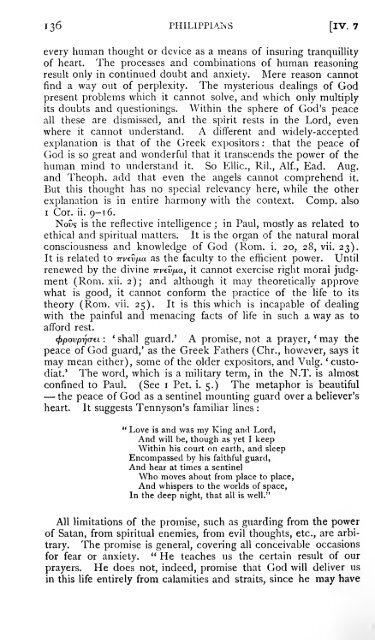Philippians and Philemon - MR Vincent - 1906.pdf
Philippians and Philemon - MR Vincent - 1906.pdf
Philippians and Philemon - MR Vincent - 1906.pdf
You also want an ePaper? Increase the reach of your titles
YUMPU automatically turns print PDFs into web optimized ePapers that Google loves.
136 PHILIPPIANS [IV. 7<br />
every human thought or device as a means of insuring tranquilHty<br />
of heart. The processes <strong>and</strong> combinations of human reasoning<br />
result only in continued doubt <strong>and</strong> anxiety. Mere reason cannot<br />
find a way out of perplexity. The mysterious dealings of God<br />
present problems which it cannot solve, <strong>and</strong> vhich only multiply<br />
its doubts <strong>and</strong> questionings. Within the sphere of God's peace<br />
all these are dismissed, <strong>and</strong> the spirit rests in the Lord, even<br />
where it cannot underst<strong>and</strong>. A different <strong>and</strong> widely-accepted<br />
explanation is that of the Greek expositors : that the peace of<br />
God is so great <strong>and</strong> wonderful that it transcends the power of the<br />
human mind to underst<strong>and</strong> it. So Ellic, Ril., Alf., Ead. Aug.<br />
<strong>and</strong> Theoph. add that even the angels cannot comprehend it.<br />
But this thought has no special relevancy here, while the other<br />
explanation is in entire harmony with the context. Comp. also<br />
I Cor. ii. 9-16.<br />
is the reflective intelligence ; in Paul, mostly as related to<br />
ethical <strong>and</strong> spiritual matters. It is the organ of the natural moral<br />
consciousness <strong>and</strong> knowledge of God (Rom. i. 20, 28, vii. 23).<br />
It is related to/as the faculty to the efficient power. Until<br />
renewed by the divine ., it<br />
cannot exercise right moral judg-<br />
ment (Rom. xii. 2); <strong>and</strong> although it may theoretically approve<br />
what is good, it cannot conform the practice of the life to its<br />
theory (Rom. vii. 25). It is this which is incapable of dealing<br />
with the painful <strong>and</strong> menacing facts of life in such a way as to<br />
afford rest.<br />
:<br />
' shall guard.' A promise, not a prayer, ' may the<br />
peace of God guard,' as the Greek Fathers (Chr., however, says it<br />
may mean either), some of the older expositors, <strong>and</strong> Vulg. ' custodiat.'<br />
The word, which is a military term, in the N.T. is almost<br />
confined to Paul. (See i Pet. i. 5.) The metaphor is beautiful<br />
•— the peace of God as a sentinel mounting guard over a believer's<br />
heart. It suggests Tennyson's famihar Hues :<br />
" Love is <strong>and</strong> was my King <strong>and</strong> Lord,<br />
And will be, thougii as yet I keep<br />
Within his court on earth, <strong>and</strong> sleep<br />
Encompassed by his faithful guard,<br />
And hear at times a sentinel<br />
Who moves about from place to place,<br />
And whispers to the worlds of space,<br />
In the deep night, that all is well."<br />
All limitations of the promise, such as guarding from the power<br />
of Satan, from spiritual enemies, from evil thoughts, etc., are arbitrary.<br />
The promise is general, covering all conceivable occasions<br />
for fear or anxiety. " He teaches us the certain result of our<br />
prayers. He does not, indeed, promise that God will deliver us<br />
in this life entirely from calamities <strong>and</strong> straits, since he may have





